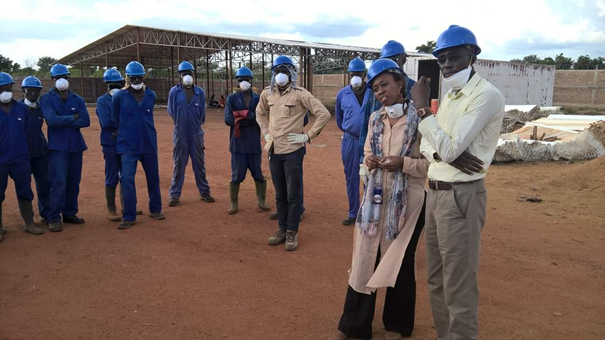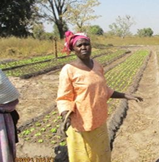
Production and Distribution Compost Project
The “Production and Distribution Compost Project” funded by ESSO Chad, aims to meet the challenges of the population in the Kome prefecture and the Nya Pende department within the Logone Oriental region of Chad. Covering an area of 9952 km², there are approximately 308,430 inhabitants of whom agriculture remains the primary source of livelihood. Unfortunately, agricultural production in the area has deteriorated progressively over the years with lands increasingly becoming degraded with extensive loss of forest cover and nutrients.
Africare’s initiative through this project is twofold:
- Increase access to compost for improved agricultural productivity
- Educate communities about the use and benefit of compost
In this project, Africare uses non-hazardous food related waste generated from Esso’s Kome Base drilling camps. Project staff were trained on the compost processing techniques process waste to convert it to compost. The project provided all the necessary supply materials for compost processing e.g. forks, Ph meter, safety body wear including coverall, air purifying mask as well as training on farming application of compost.
Results of the project in 2020:
Overall, the project was successful in increasing soil productivity and protecting the environment particularly around the oil sites.
- 113 tons of compost were produced;
- 441tons of food waste was removed from the environment and recycled into compost ;
- 218 beneficiaries including 105 women from 19 villages received 112 tons of compost and 24 tons of compost were distributed to 173 market gardeners;
- 100% of beneficiaries used compost on 50.87 hectares;
- Increase in productivity of farms that used project produced compost as compared to farms without compost. For peanuts , sesame, maize, rice and sorghum, an increase in yield was 83%, 76%, 104%, 30% and ;
- 43% respectively was observed;
- Increased household income for the neighboring communities. 20 households, many of whom are headed by widows were employed temporarily on the compost site. Additionally, the project purchased 30 tons animal waste from neighboring communities;
- 97 producers were trained on new cultivation and organic fertilization techniques;
- Established a demonstration site with 3,018 plants (fruit and non-fruit trees and flowers). These included 232 banana plants, 60 papaya plants, 30 mango trees;
- Established a nursery with 19,315 plants, similar to those in the demonstration sites. Plants in the nursery were distributed to community members to improve food diversity but also for increased soil conservation by reducing the impact of increased desertification;
- Provided training and agricultural technical expertise to support market gardeners. The market gardening activity practiced in the off-season is very important for producers who suffer the full brunt of the effects of climatic disturbances and soil degradation leading to very disappointing yields.
Testimony from the Field
 Compost is a very useful natural fertilizer, especially for market gardening. The crops are growing well and the leaves are larger and better in color. I sell my crops more easily after using compost because the leaves attract customers. As my plants grow faster, I can sell more than those that don’t use compost. I take care of my needs (clothing, kitchen utensils) and help my husband, who does
Compost is a very useful natural fertilizer, especially for market gardening. The crops are growing well and the leaves are larger and better in color. I sell my crops more easily after using compost because the leaves attract customers. As my plants grow faster, I can sell more than those that don’t use compost. I take care of my needs (clothing, kitchen utensils) and help my husband, who does
not do market gardening, to complete the school and food expenses of our household – Madame NABARNODJI CHARLOTTE from the village MadanaNadrpeur is a lettuce producer


